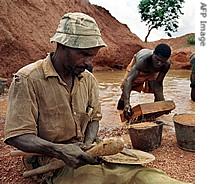2006年VOA标准英语-UN Struggles to Enforce Diamond Ban in Ivory Co(在线收听)
By Franz Wild
Seguela, Ivory Coast
22 December 2006
Diamonds coming out of the rebel-held north of Ivory Coast are the only ones in the world the United Nations still describes as conflict diamonds. The U.N. is still unable to stop a steady stream of illicit diamonds making it onto the world market, despite an embargo. Franz Wild visited Séguéla for VOA, where most of Ivory Coast's diamonds are mined.

Men look into their sifter to find a diamond stone (File)
In the protection of his house, a dealer opens a twist of paper revealing seven diamonds, all the size of peppercorns. Each will eventually fetch thousands of dollars when cut and sold on the world market.
In Séguéla, the small and dusty town, which produces the majority of Ivory Coast's diamonds, few will give their names. They fear trouble with the rebel New Forces who control the north of Ivory Coast and with it its diamond industry.
The New Forces have occupied the north since a 2002-2003 civil war. Diamonds are only found in the north. Last year, the U.N. Security Council imposed a diamond embargo on Ivory Coast, after its experts found the New Forces were profiting from the trade.
In recent reports, a group of U.N. experts who studied the trade says up to $23 million worth are smuggled out of rebel-held Ivory Coast annually, and the rebels are controlling the trade.
The group's head, Alex Vines, says they have a clear idea of who is responsible for breaching the ban.
"The result of the field research was to show that Ivorian diamonds are smuggling to neighboring states, particularly to Mali, but also to Ghana where they enter the official Ghanaian certification scheme and then into the international market, both Antwerp and the United Arab Emirates," he said.
The Bobi Dyke, is the largest open mine in the Séguéla area. The 14 meters deep wound in the earth runs on for a few hundred meters. Workers who are paid $5.00 a week shovel earth. They have no machines more sophisticated than the little pumps they use to get rid of the water in the holes they dig. When they reach a new layer of gravel, they wash it in the river, under the watchful gaze of rebel soldiers, who see each diamond coming out.
Like the rebel leadership, most in the industry deny the New Forces do anything more than provide security for the diamond miners.
Issiaka Dosso has eight men working on his hole. He says, the U.N. does not understand what is going on here. He says, there are wars of arms and there are wars of ideas. This is part of a war of ideas against the rebels. He denies diamonds finance the rebellion.
For Dosso the ban has just meant dealers pay less. In the eight months his men have been working that hole, he says he has not made any profit yet. He insists, diamond mining is not as lucrative as people think.
But a digger in his mid-teens says he has seen rebel soldiers simply pocket diamonds as they are discovered. He says, they take some diamonds just like that without paying anything. Then, he says, they go and sell them in Séguéla. "I'm mad," he says, "because they steal our diamonds."
And Dosso confirms that the dealers send the diamonds abroad to sell them. He says, if they do not leave Ivory Coast people would not be able to sell them. There are some dealers, who are, say, Malian, who used to be here, but are now in Mali and are still buying diamonds through agents.
In town, everyone talks about Sekou Sidibe being the biggest dealer in Séguéla. Little Sekou, as they call him, has a rebel soldier with him at his office. He will not be recorded and denies still dealing in diamonds, even though the U.N. experts name him in their reports.
All he will say is that they were always dealing in diamonds and it does not make sense for them to stop their trade, just because two groups started fighting each other. He insists they have nothing to do with the war, and they are just making a living.
For the diamond industry, the increased attention is not welcome during its peak pre-Christmas sales period. A recent Hollywood release called Blood Diamond stars Leonardo DiCaprio as a diamond smuggler during Sierra Leone's bloody 1991 to 2002 civil war, which was largely funded through diamond money.
Ivory Coast is considered the last spot in the world, which still produces conflict diamonds. The U.N. Security Council now has the option of imposing sanctions on any individuals considered in breach of the ban.